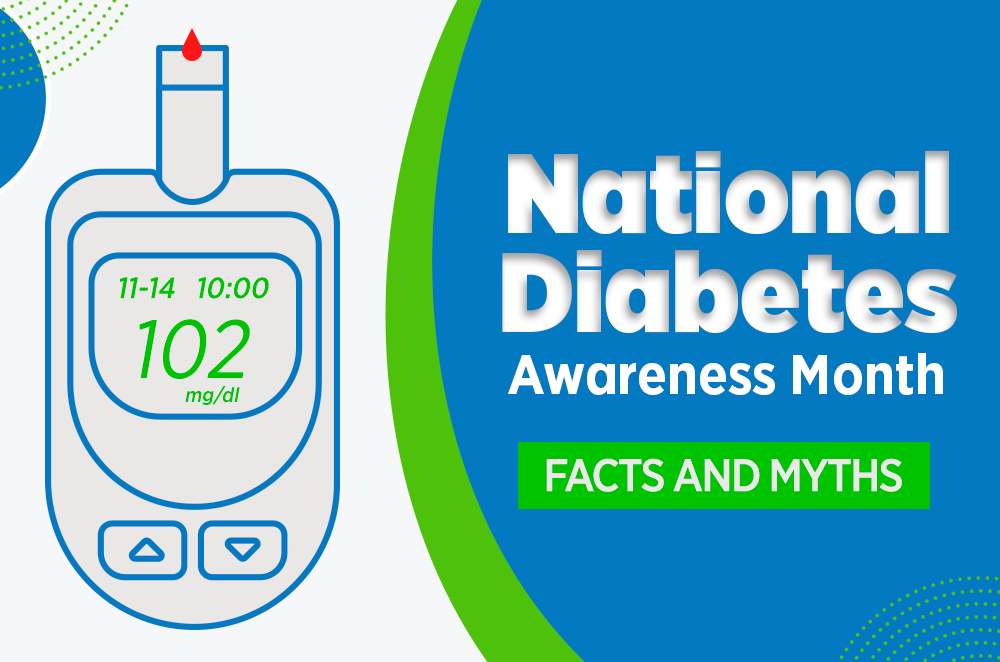Diabetes Facts and Myths
Do you know someone who has diabetes or are you someone living with diabetes? In the United States, more than 18 million people have diabetes which equates to 1 in 10 people. During November, we celebrate National Diabetes Awareness month, bringing attention to a disease that comes with many stigmas about what it truly is and discussing Diabetes facts and myths.
What is Diabetes?
Diabetes is the name given to disorders in which the body has trouble regulating its blood-glucose, or blood-sugar, levels. There are many different forms of diabetes as well as causes, and possible symptoms from a diabetes diagnosis.
Types of Diabetes
Type 1 Diabetes
Type 1 Diabetes (T1D) is an autoimmune disease that is caused when the body’s immune system mistakenly destroys insulin-producing beta cells in the pancreas. People who live with T1D are dependent on insulin and there is currently no cure.
Type 2 Diabetes
Type 2 Diabetes (T2D) is a metabolic disorder where the body still makes insulin but is unable to use it properly. While some Type 2 Diabetics can manage their blood sugar with a healthy lifestyle, others may need medication or insulin to manage it.
Gestational Diabetes
Gestational Diabetes Mellitus (GDM) is a form of diabetes that affects pregnant women and occurs in 1 in 25 pregnancies, worldwide. Some women can manage blood sugars with a healthy lifestyle, but some must take medication and insulin. GDM is commonly diagnosed as high blood glucose starting between 24 and 28 weeks of pregnancy.
LADA
Latent Autoimmune Disease in Adults (LADA) is a form of Type 1 Diabetes that is diagnosed in adulthood and commonly misdiagnosed as Type 2 Diabetes. LADA is the result of your immune system attacking the beta cells in your pancreas that produce insulin. The only difference is that this attack is slower which means your insulin production declines at a slower rate compared to type 1—but a much faster rate compared to type 2. This phase is called the Honeymoon phase.
There are other forms of Diabetes, and they are rare diagnoses. Those forms are Monogenic Diabetes, Brittle Diabetes, and Wolfram Syndrome.
Symptoms
The most common symptoms that people face prior to diagnosis are:
- Frequent urination
- Increased thirst
- Dry mouth
- Itchy or dry skin
- Increased appetite
- Unexplained weight loss
- Yeast infections
Myths
Can people with diabetes eat sweets or chocolate?
- Yes, people with diabetes can eat sweets or chocolate. Diabetics who take insulin, simply need to inject the correct dosage of units to cover the amount of carbs they are eating. Although, it is suggested to have smaller amounts of sugar at a time.
Can Diabetics have carbs?
- Yes, there is no evidence to suggest that people with diabetes need to avoid carbs, though some people choose eating plans that are lower carb. In fact, the evidence suggests that including the right amounts of carbs, protein, and fat can help manage your blood glucose levels. Working with your healthcare team can help you find the right balance for you.
If you’re overweight, will you always develop type 2 diabetes?
- No, being overweight is a risk factor for developing diabetes, but other risk factors such as how much physical activity you get, family history, ethnicity, and age also play a role. Unfortunately, many people think that weight is the only risk factor for type 2 diabetes, but many people with type 2 diabetes are at a normal weight or only moderately overweight at diagnosis.
A Message From A Type 1 Diabetic
“I was diagnosed at 21 and have been living with Type 1 Diabetes for nearly 4 years now. Before diagnosis, I was experiencing every symptom that I could possibly have but kept denying the fact that I might have diabetes. There’s such a stigma about diabetes in the United States about diabetes and I didn’t want that to be me. Even after diagnosis, I received multiple questions like, “Is that the good one or bad one?” or “You don’t look diabetic.” However, I’ve come to learn to embrace this disease and educate others about it to help eliminate the stigma. If you are a diabetic, you are not alone!”
If you are someone living with diabetes, CCMH offers diabetes education to help those navigate through diagnosis and different management styles.
Sources:
https://diabetes.org/tools-support/diabetes-prevention/diabetes-myths
https://beyondtype1.org/other-forms-of-diabetes/
https://www.jdrf.org/t1d-resources/about/

